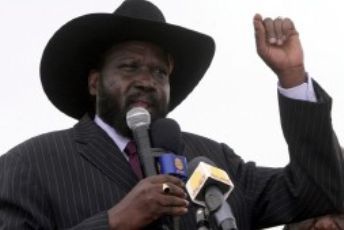Kiir pledges to empower traditional leadership in Sudan
By Ngor Arol Garang
July 16, 2010 (WUNROK) — The President of the semi-autonomous government of Southern Sudan Salva Kiir has pledged to empower traditional leaders as an alternative mean to resolve the rising number of boundary disputes in the region.

Kiir’s letter was reportedly responding to one from chiefs in Central Equatoria state, asking for his intervention in the political differences that continue to exist in the state. The letter dated 15 June 2010, signed by seventeen chiefs, called on GoSS president to create conducive political atmosphere in the state.
The top Southern leader said traditional leadership should first and foremost verify and submit to government their findings with recommendations in order to curb the trend of conflicts.
“Chiefs have a stake in both dispute and development initiatives at any level,” said President Kiir adding that he hoped people will be able to have easy access to managing their own affairs.
Urging traditional leaders to freely raise issues by way of counsel or suggestion so that people’s access to services is realized, he assured them of the government’s commitment to attentively listen to some of their suggestions and recommendations.
“I can assure you that my administration will listen to you attentively. This was why in 2008; government approved the purchase of vehicles for chiefs in order to facilitate their movement in their territorial boundaries”, he said.
These vehicles are meant to facilitate traditional rulers’ tours of their chiefdoms to ensure they are kept informed about what village headmen do in promoting national development.
“It is the role of headmen and senior headmen to work with their chiefs to maintain law and order and improve governance,” he further added.
Kiir said by promoting and encouraging communication from the grassroots to
the top of the hierarchy, government would be able perform more effectively.
He said government approved the decentralization implementation plan in the last year’s gubernatorial conference held in Juba noting that it led to the transfer of specified government functions to councils.
The government further expects that mechanisms for community participation will be quickly formulated; he said explaining that consultative meetings have since last year been held.
Kiir stressed the importance of the process because chiefs operate at a community level and preside over huge communities, the more reason why their input in the kind of county and Payam structures is vital.
He also said that the government also accelerated fiscal decentralization under the regional decentralization policy.
“We have over the past three years increased inter-governmental fiscal transfers; that are grants from one percent of the national budget to three percent,” he said.
In doing so, government has provided millions of dollars to each of the ten states of Southern Sudan, in addition to counties in addition to the formula-based grants and grant-in-lieu of rates.
He said these measures will not only enhance service delivery but will also strengthen compliance to regional policies and legislation.
To strengthen capacities in counties and councils; government will introduce the Local Government Service Committee that will deal with issues of recruitment and staff development.
He said government recognizes chiefs’ contribution to development and will continue working with all of them to ensure that development programmes equally benefit rural and urban areas.
While reiterating assurance of his government to observing the rule of law, democracy and good governance, he said his administration will continue with the fight against corruption and any activities that tend to promote crime and disorder, including politically motivated violence.
The President said he is fully aware of the duties chiefs perform in their areas and urged every chief to help the government in maintaining law and order among Southern Sudan.
He further added that his administration seeks plans and policies to strengthen traditional rulers’ involvement in the management and development of the region’s affairs.
“May I also take this opportunity to assure chiefs and citizens of Southern Sudan that the doors of my government are always open for you to advise on matters affecting our people? Be free to approach your governors, the Vice-President or indeed my office. I am open to consultation and so is my government,” Kiir said.
(ST)

Mzalendo Mwema
Kiir pledges to empower traditional leadership in Sudan
Very excogitative president.This was one of the most reasons as why Israel decided to have a king.
murlescrewed
Kiir pledges to empower traditional leadership in Sudan
Now Kiir is about to relinquish the duties and responsibilities of the state to a bunch of illiterate. Way to go there, pal. We will wait to see the outcome of that experiment.